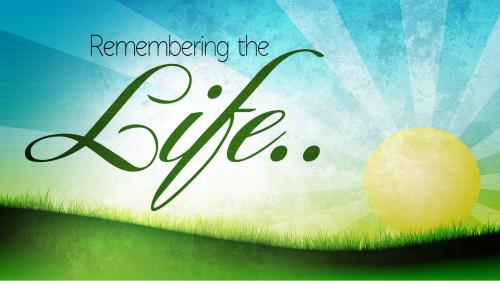-
Sermon For A Funeral: The Heroes Of Life & Death
Contributed by William Meakin on Aug 16, 2024 (message contributor)
Summary: A hero is defined in the dictionary as a person who is admired for their courage, outstanding achievements, or noble qualities.
What is a hero? Joseph Campbell an American writer once remarked: “A hero is someone who has given his or her life to something bigger than oneself.” Romans 15:1-2 reminds us: “We who are strong have an obligation to bear with the failings of the weak, and not to please ourselves. Let each of us please his neighbor for his good, to build him up.”
A hero is defined in the dictionary as a person who is admired for their courage, outstanding achievements, or noble qualities. They are considered the paladins of life, chronicled as a knight who engaged in combat for a king during the Middle Ages. It is a person who fights for a cause that predominantly displays and includes the high values of chivalry. Heroism could be regarded as a strength that sustains life. It is close to earthly perfection. As we know, God loves everyone and encourages goodness. Goodness reflects heroism. A hero in life can also remain a hero in death from the beneficial deeds done on earth. Galatians 5:22-23 confirms: “But the fruit of the Spirit is love, joy, peace, patience, kindness, goodness, faithfulness, gentleness, self-control; against such things there is no law.”
The accolade of hero may be ascribed to a person who overcomes evil with goodness, refutes temptation with dissuasion and possesses a heart and mind that is receptive to all. It could relate to a mythological or legendary figure of great stature and ability, or it could be just a normal person of good measure with a heart filled with kindness who is loved by so many.
Life is but a brief moment in time. Each of us who is a child of God is allocated an allotted period on earth on which to dwell. However, it should be remembered that death on earth does not mean the end of an existence, it is merely a stepping-stone to a new life and beginning. A life of happiness where no pain exists and a life of freedom. A life of unity with others, both old and new, where we sit in the green pastures enjoying the abundance of fruit that never dwindles and the waters that remain pure and clean. Just as Jesus Christ died and was resurrected into new life, so we too enjoy the same with the mercy of God.
There is no need for sadness, nor the sufferance of pain. A loved one has departed for the joy of God’s domain. Ecclesiastes 3:1-8 reminds us: “There is a time for everything, and a season for every activity under the heavens: a time to be born and a time to die, a time to plant and a time to uproot, a time to kill and a time to heal, a time to tear down and a time to build, a time to weep and a time to laugh, a time to mourn and a time to dance, a time to scatter stones and a time to gather them, a time to embrace and a time to refrain from embracing, a time to search and a time to give up, a time to keep and a time to throw away,
a time to tear and a time to mend, a time to be silent and a time to speak, a time to love and a time to hate, a time for war and a time for peace.”
There is strong argument that heroes are born. Others refute that concept and believe that they are made. Perhaps both viewpoints apply to life. Heroes can be acclaimed by courageous and unselfish acts in times of conflict or they may be present in the characteristics of behavior, and principles. Kindness to others should be regarded as an act of heroism. Equally personal strength is another important factor in any field of protection. Perhaps one of the most incontestable qualities is that of placing the needs of others before oneself. Heroism suffocates fear with its strength. It provides hope and assurance to others. For some, one of the most feared prospects in life is the prospect of personal death. To look death in the face takes tremendous courage and strength. Its characteristics always remain unknown which is often the root of fear. The great Shawnee chief and warrior Tecumseh born in Ohio, America in 1768 once remarked: “When your time comes to die, be not like those whose hearts are filled with fear of death, so that when their time comes they weep and pray for a little more time to live their lives over again in a different way. Sing your death song, and die like a hero going home.”
Life could be equated to a musical symphony. Its structure often consists of four separate movements, each with a definitive theme. These may include the first movement which would formerly have been referred to as the overture, followed by a second and third movement and concluding with a grand finale. The second movement often represents a slower and more lyrical composition portrayed in andante style, the third may comprise a dance or scherzo in the form of a dance in a light or quick tempo.

 Sermon Central
Sermon Central



